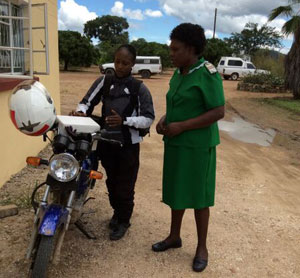- What We Do
- Agriculture and Food Security
- Democracy, Human Rights and Governance
- Economic Growth and Trade
- Education
- Ending Extreme Poverty
- Environment and Global Climate Change
- Gender Equality and Women's Empowerment
- Global Health
- Water and Sanitation
- Working in Crises and Conflict
- U.S. Global Development Lab

A network of motorcycles is used to quickly deliver sputum samples from clinics to be tested in laboratories.
Photo credit: TB Care
The ability to detect TB through improved methods such as the Xpert diagnostic test has opened the door to rapid and effective diagnosis of HIV-associated TB. Standard methods for detecting TB are either not sensitive enough (smear microscopy) or take too long (culture) to accurately and rapidly detect TB in people living with HIV (PLHIV).
Healthcare workers often treat PLHIV for TB based on symptoms alone or do not treat them at all, resulting in a large number of unnecessary deaths. In 2014, USAID developed and implemented pilot projects to address this issue in Nigeria and Zimbabwe. These projects were designed to:
- Increase the number of PLHIV tested for TB with Xpert and initiated on treatment
- Increase the accessibility and quality of Xpert testing services
- Improve collaboration between TB and HIV services
- Inform global, national and sub-national policy and practices
In two states in Nigeria (Niger and Nasawa), a USAID project implemented Xpert according to a “hub and spoke” model that connected 10 remote TB testing sites in each state to one Xpert instrument at a centrally located hospital. A new referral transport system was successfully created and TB/HIV services and coordination were strengthened. These efforts resulted in a 16 percent increase in TB case detection among PLHIV. Achievements and lessons learned from this pilot will inform Nigeria’s roll-out and use of 185 additional Xpert instruments currently being procured through a Global Fund grant.
In pilot sites in Zimbabwe, USAID supported intensive training to healthcare workers in clinical settings – a shift from the usual focus on training only laboratory staff. In addition, the use of Xpert was expanded, with Xpert testing being used as the first TB test for PLHIV with signs and symptoms of TB. A sub-set of asymptomatic persons newly diagnosed with HIV were also tested for TB using Xpert, with the hope of increasing detection of TB in this vulnerable population. USAID also expanded and improved on Zimbabwe’s TB specimen transport system, “Riders for Health.” Preliminary results show a six-fold increase in the number of Xpert tests performed in Mutare District and Mutare City, and a four-fold increase in the number of TB and MDR-TB cases diagnosed among PLHIV.







Comment
Make a general inquiry or suggest an improvement.